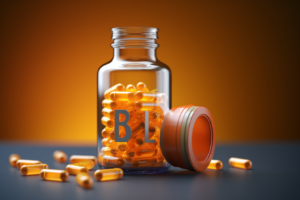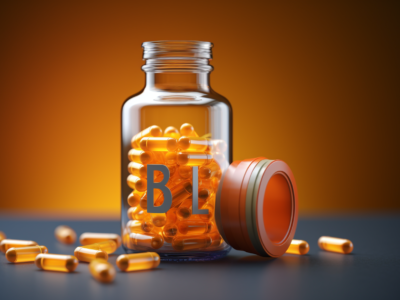Vitamin B12 is a crucial nutrient that plays an essential role in many bodily functions. From promoting healthy nerve function to aiding in red blood cell production, this vitamin is a significant contributor to overall health. However, not everyone gets the recommended daily intake of Vitamin B12 through their diet alone, making supplementation necessary for some individuals. In this article, we will explore everything you need to know about Vitamin B12 dosage and the recommended daily intake as a part of your routine for optimal health and wellbeing.
Understanding Vitamin B12: What is it and Why is it Important?
Vitamin B12 is a water-soluble vitamin and an essential nutrient for the human body. It helps to maintain healthy nerve function, promotes red blood cell production, and aids in DNA synthesis. The human body cannot produce Vitamin B12 on its own, which means it must be obtained from dietary sources or supplements.
 The recommended daily intake of Vitamin B12 varies by age group and health status. Individuals who follow a vegan or vegetarian diet may have difficulty meeting their daily requirements because this vitamin primarily occurs in animal products such as meats, dairy products, eggs, and fish.
The recommended daily intake of Vitamin B12 varies by age group and health status. Individuals who follow a vegan or vegetarian diet may have difficulty meeting their daily requirements because this vitamin primarily occurs in animal products such as meats, dairy products, eggs, and fish.
Deficiencies in Vitamin B12 can cause symptoms ranging from fatigue and weakness to neurological problems like numbness or tingling in extremities. Consequently, it is vital for individuals at risk of deficiency to ensure adequate consumption either through diet or supplementation for optimal health outcomes.
Daily Recommended Intake: How Much Vitamin B12 Do You Need?
Daily Recommended Intake: How Much Vitamin B12 Do You Need?
Vitamin B12 is an essential nutrient that the body requires for healthy nerve function, DNA synthesis, and red blood cell formation. The recommended daily intake of vitamin B12 varies depending on age, gender, dietary restrictions, and other factors. According to the National Institutes of Health (NIH), adults over 18 years old should aim to receive at least 2. 4 micrograms of vitamin B12 per day through food or supplements.
Individuals who follow a vegan diet or have certain medical conditions may require higher doses of vitamin B12 supplementation than the average person. If you are unsure about your specific needs for vitamin B12 supplementation, consult with a healthcare professional for personalized recommendations based on your health status, lifestyle habits and nutritional requirements.
Overall, ensuring adequate intake of this vital nutrient can help optimize mental and physical wellbeing by promoting proper brain function in addition to supporting healthy skin hair nails among other benefits.
Food Sources of Vitamin B12: Incorporating It into Your Diet
Incorporating Vitamin B12 into your diet is crucial for maintaining optimal health and wellbeing. However, not all food sources provide sufficient amounts of this essential nutrient. Some excellent dietary sources of Vitamin B12 include animal-based products such as meat, poultry, fish, and dairy products. Vegetarians and vegans can obtain their recommended daily dose from fortified cereals and plant-based milk alternatives.
As mentioned earlier, certain individuals may require additional supplementation to meet their daily requirement of Vitamin B12. The recommended amount varies based on age, gender and other factors. For instance, adults over the age of 50 are often advised to consume a larger quantity due to reduced absorption rates with aging.
To sum up, incorporating adequate amounts of vitamin B12 into one’s diet has numerous benefits for overall health. Consuming a balanced diet that includes foods rich in this nutrient or considering supplements can help ensure that you meet the recommended daily dosage necessary for optimal function across various bodily functions like nervous system health and red blood cell production regulation among others.
Health Conditions that Affect Vitamin B12 Absorption: Who is at Risk of Deficiency?
Several health conditions can disrupt the absorption of Vitamin B12 in the body, resulting in a deficiency. Individuals with pernicious anemia, which causes damage to stomach cells that produce intrinsic factor (a protein necessary for B12 absorption), are at high risk of developing this condition. Additionally, anyone who has had surgery involving the removal of part or all of their stomach may be at higher risk due to reduced production of intrinsic factor.
 People who follow strict vegan diets may also be more likely to develop a Vitamin B12 deficiency since animal products are typically rich sources of this nutrient.
People who follow strict vegan diets may also be more likely to develop a Vitamin B12 deficiency since animal products are typically rich sources of this nutrient.
Those with digestive disorders such as Crohn’s disease or celiac disease may also have difficulty absorbing enough Vitamin B12 from food alone and require supplementation.
If left untreated, deficiencies can lead to neurological problems and blood disorders.
It is important for individuals with these conditions and those at higher risk for deficiency due to dietary restrictions to regularly monitor Vitamin B12 levels through blood tests and potentially supplement their intake under medical supervision. Adequate consumption plays a crucial role in maintaining healthy nerve function, DNA synthesis and energy metabolism; therefore ensuring sufficient daily intake must become part of an individual’s routine for overall well-being.
Types of Vitamin B12 Supplements: Which One is Right for You?
Vitamin B12 supplements are available in different forms, and choosing the right one can be overwhelming for some people. The most popular types of supplements include cyanocobalamin, methylcobalamin, adenosylcobalamin, and hydroxycobalamin. Cyanocobalamin is the synthetic form of Vitamin B12 commonly found in multivitamins and fortified foods. Methylcobalamine is a natural form readily absorbed by the body while Adenosylcobalamine plays an important role in energy production. Hydroxycobalamine is used to treat deficiency symptoms caused due to intrinsic factor deficiency or any other digestive disorders.
The type of supplement you should take depends on your specific needs and medical history. Cyanocobalamin supplementation may suffice if you have mild Vitamin B12 deficiency or want to prevent it as part of your routine diet. However, those with digestive issues like IBS may benefit more from taking methylcobalamine sublingual tablets that are easily absorbed through mucous membranes around the mouth for higher bioavailability and faster results than oral pills will provide. Consult with your healthcare professionals before beginning supplementation to determine which type would best suit your health goals.

Vitamin B12 Dosage: How Much Should You Take and When?
Vitamin B12 is an essential vitamin that cannot be produced by the human body and must be obtained through diet or supplementation. The recommended daily intake for Vitamin B12 varies depending on age, gender, and overall health status. For most adults, the recommended daily dose should range from 2. 4 to 2. 8 micrograms per day.
Individuals who are at risk of a deficiency due to poor absorption or inadequate dietary intake may require higher doses of Vitamin B12 supplements to maintain optimal levels in their bodies. It is important to consult with a healthcare professional before starting any supplement regimen to ensure proper dosage and avoid potential adverse effects.
Overall, incorporating enough Vitamin B12 into your diet can have numerous benefits for your health and wellbeing. By adhering to the recommended dosage guidelines and consulting with a healthcare professional when necessary, you can effectively supplement this crucial nutrient as part of your routine for optimal health maintenance.
Monitoring Vitamin B12 Levels: The Importance of Regular Testing
Regular testing of Vitamin B12 levels is crucial for maintaining optimal health. As a vital nutrient, Vitamin B12 plays an essential role in various bodily functions, including nerve function and red blood cell production. However, since some individuals may not get the recommended daily intake of this vitamin through their diet alone, it’s necessary to supplement their intake with oral or injectable forms.
Monitoring your Vitamin B12 levels through regular testing can help you determine if you’re getting enough of this critical nutrient. If your body lacks sufficient amounts of Vitamin B12, you may experience symptoms such as fatigue, weakness, numbness in the hands and feet, and difficulty concentrating. By identifying these signs early on through routine testing, you can prevent more severe deficiencies that can lead to irreversible neurological damage.
In conclusion, monitoring your Vitamin B12 levels should be an essential part of your overall healthcare regimen if you want to maintain optimal health and wellbeing. Consult with your healthcare provider about appropriate dosage recommendations based on your specific needs and ensure that regular testing is a component of any supplementation plan they prescribe.
Summary
Vitamin B12 is important for numerous bodily functions, and the right amount of daily B12 intake is vital for maintaining overall health. According to the National Institutes of Health, the recommended daily amount for adults is 2.4 mcg of vitamin B12. Pregnant and breastfeeding women require slightly higher amounts, 2.6 mcg and 2.8 mcg respectively.

However, the question “How much vitamin B12 should I take daily?” might have different answers depending on individual health circumstances. People with certain health conditions, such as those deficient in B12 due to issues absorbing vitamin B12, may need a higher dosage. This is because less stomach acid is available to absorb vitamin B12 from the foods you eat.
A B12 deficiency can lead to symptoms such as lack of energy, and is associated with anemia and neurological issues.
If you’re deficient, your health care provider may recommend you take a high initial dose of vitamin B12 daily for a month, often 500 mcg, followed by a maintenance dose of 125-250 mcg. This regimen helps raise levels of B12 quickly to address deficiency, then maintains those levels.
Some individuals may benefit from higher amounts of vitamin B12 due to age, dietary restrictions, or specific health conditions. However, even though the body excretes excess B12, always talk to your health care provider before taking higher than the tolerable upper intake, as some may experience side effects from large doses. Read on to learn more about vitamin B12 intake and consult a healthcare professional to understand your specific needs.
Frequent Question
Q: What is the recommended daily intake of vitamin B12?
A: The recommended daily intake of vitamin B12 is 2.4 mcg per day for adults.
Q: Why do we need vitamin B12?
A: Vitamin B12 is essential for many bodily functions, including red blood cell formation, proper nerve function, and DNA synthesis.
Q: What are the best sources of vitamin B12?
A: Vitamin B12 is found naturally in animal products such as meat, fish, dairy, and eggs. It can also be found in fortified foods and supplements.
Q: Should I take a vitamin B12 supplement?
A: If you are not getting enough vitamin B12 from your diet, supplementing with a B12 supplement may be beneficial. It is always recommended to consult with a healthcare provider before starting any supplement regimen.
Q: Can taking too much vitamin B12 be harmful?
A: Research suggests that high doses of vitamin B12 are generally safe for most people. However, it is important to not exceed the daily recommended intake of 2.4 mcg unless advised by a healthcare provider.
Q: Can vitamin B12 be absorbed through the skin?
A: Vitamin B12 is not readily absorbed through the skin. It is typically absorbed through the digestive system.
Q: Do older adults require a higher daily intake of vitamin B12?
A: Yes, older adults may require a higher daily intake of vitamin B12 due to decreased ability to absorb the vitamin from food.
Q: Can low levels of vitamin B12 lead to health issues?
A: Yes, a deficiency in vitamin B12 can lead to a variety of health issues, including anemia, nerve damage, and cognitive decline.
Q: What are the symptoms of a vitamin B12 deficiency?
A: Symptoms of a vitamin B12 deficiency may include fatigue, weakness, tingling or numbness in the hands and feet, difficulty walking, mood changes, and cognitive difficulties.
Q: Can vitamin B12 be administered through injections?
A: Yes, vitamin B12 injections are a method of administering the vitamin for those who have issues absorbing it through the digestive system.



 B Vitamins and Their Role in Cardiovascular Health
B Vitamins and Their Role in Cardiovascular Health
